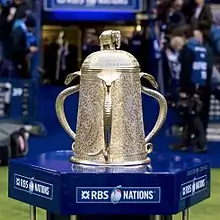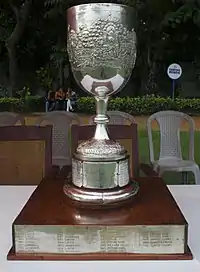Calcutta Cup
The Calcutta Cup is the trophy awarded to the winner of the rugby match between England and Scotland. It is the oldest of several trophies awarded under the umbrella of the Six Nations Championship, which include the Millennium Trophy, Centenary Quaich, Giuseppe Garibaldi Trophy, Auld Alliance Trophy, the Doddie Weir Cup (the last two were first contested in 2018).
| Calcutta Cup | |
|---|---|
 | |
| Given for | Winning the annual England versus Scotland match. |
| Country | |
| Presented by | Six Nations Rugby |
| History | |
| First award | 1879 |
| Most recent | |
| Website | www |
The Calcutta Cup was first competed for in 1879 and the current holder is England, who have won the cup the most times overall with 71 wins to Scotland's 40.
The cup is of Indian workmanship, decorated with cobras and an elephant.
Calcutta Club
On Christmas Day 1872, a game of rugby football, between 20 players representing England on one side and 20 representing Scotland on the other, was played in Calcutta.
The match was such a success that it was repeated a week later. These lovers of rugby wanted to form a club in the area and the aforementioned matches were the agents which led to the formation of the Calcutta Football Club in January 1873.
The Calcutta Club joined the Rugby Football Union in 1874. Despite the Indian climate not being entirely suitable for playing rugby, the club prospered during that first year. However, when the free bar had to be discontinued, the membership took an appreciable drop. Other sports, such as tennis and polo, which were considered to be more suited to the local climate, were making inroads into the numbers of gentlemen available. On the suggestion of G.A.J. Rothney, the secretary, the members decided to disband but keen to perpetuate the name of the club, they withdrew the club's funds from the bank, which were in Silver Rupees, had the 270 Rupees melted down and made into a cup which they presented to the Rugby Football Union in England in 1878, with the provision that it should be competed for annually.
The cup
The cup is of Indian workmanship, approximately 18 inches (45 cm) high, the body is finely engraved with three king cobras forming the handles. The domed lid is surmounted by an elephant which is, it is said, copied from the Viceroy's own stock. The inscription on the Cup's wooden base reads: THE CALCUTTA CUP.
The base has attached to it additional plates which record the date of each match played with the name of the winning country and the names of the two captains. There is an anomaly in the recording of the winning country on the base of the Cup. It was first played for in 1879, but the plinth shows records extending back to the first international in 1871.
The original trophy is in a very fragile state following many years of poor treatment and is not in a strong enough condition to attend functions or go on tours. When won by England the original Calcutta Cup is put on public display in the Museum of Rugby in Twickenham, where it slowly turns around in a purpose built showcase. Both nations have full size replicas of the Cup. Whilst the original was handmade by Indian craftsmen, the replicas were made using modern technology.
In 1988 the cup was damaged by the antics of some drunken players, including England number eight Dean Richards and Scotland flanker John Jeffrey who played football with the Calcutta Cup along Princes Street in Edinburgh. Jeffrey received a six-month ban from the SRU, whilst Richards was given a one-match sentence from England.[1]
Competition
Despite the initial request of the Calcutta Club that the trophy be used as rugby's answer to football's FA Cup, the RFU refused to turn the Calcutta Cup into a knock-out competition for English club sides. They believed that "competitiveness" ran against the amateur ethos and instead decided that a game should be played each year between England and Scotland and whoever wins should keep it for that year. The first Calcutta Cup match was played at Raeburn Place, Edinburgh, on 10 March 1879 and ended in a draw; Scotland scored a drop goal and England a goal. The following year on 28 February 1880 England became the first winners of the Calcutta Cup when they defeated Scotland by two goals & three tries to one goal in Manchester. Matches have continued on an annual basis except for two interruptions due to the World Wars between 1915–1919 and 1940–1946.
As of 2019, 126 Calcutta Cup matches have taken place. Currently, this game is the annual match between the two nations in the Six Nations Championship. The ground alternates between Murrayfield Stadium in Edinburgh (on even years) and Twickenham Stadium in London (on odd years).
In 2004, the two countries' rugby governing bodies, the Rugby Football Union (England) and the Scottish Rugby Union, were considering a plan to add a second Calcutta Cup fixture each year, outside the Six Nations. The second fixture would be hosted by the away nation in the Six Nations fixture of the same year. Under that plan, one nation would have to win both matches to take the Cup off its current holder. Due to a largely unfavourable reaction, the proposal soon disappeared from view.
Results
Since 1879, the Calcutta Cup has been played 126 times.
Records
| Team | Wins |
|---|---|
| 71 | |
| 40 |
The cup has been tied 16 times.
The current record number of points scored by a player in a Calcutta Cup game was set by Jonny Wilkinson in 2007 when he scored 27 points (1 try, 2 conversions, 5 penalties, 1 drop goal). The previous record of 24 points was held by Rob Andrew.
Other Calcutta Cups

In 1884 Calcutta Cricket and Football Club again set up a rugby section and in 1890 set up an inter club trophy, the Calcutta Rugby Union Challenge Cup, promptly christened the Calcutta Cup.[5]
The Cup is currently held by Jungle Crows who beat CC&FC. The second division trophy was won by Calcutta Cricket and Football Club Panthers.[6]
The original and oldest Calcutta Cup is a silver trophy played for annually by the members of Royal Blackheath Golf Club. It was a gift from the Royal Calcutta Golf Club in response to the presentation of a medal given by Blackheath. It is made from melted down silver rupees, reputedly from the same batch of melted down silver rupees as the Rugby Union Cup played for between England and Scotland. The cup arrived in London in 1875. It was first played for in December 1875 three years before the first Calcutta Cup match between England and Scotland. The Cup held by Royal Blackheath Golf Club has only 2 handles unlike the well known Calcutta Cup. It is only in recent years that the history of the original Calcutta Cup has been appreciated by sporting historians.
Royal Blackheath Golf Club members had close links with Blackheath Football Club (Rugby) which was one of the most prominent Clubs in the early years of the Rugby Football Union. Members of both clubs served in India in the 1870s. This link is the most likely explanation for the creation of a similar cup being created by the Calcutta rugby Club a few years later and becoming the world-famous Calcutta Cup.
See also
- Rugby union trophies and awards
- Le Crunch, a long-standing rivalry between England and France
- Millennium Trophy, for winners of England v. Ireland in the Six Nations
- Giuseppe Garibaldi Trophy, for winners of France v. Italy in the Six Nations
- Triple Crown Trophy, whoever (if any) wins all games between England, Ireland, Scotland and Wales in the Six Nations
- Rugby union in India
- England–Scotland football rivalry in association football
References
- "The Calcutta Cup goes kickabout". ESPN Scrum. Retrieved 22 March 2015.
- BBC. "Scotland lose 15-9 to Jones' England". Retrieved 23 September 2017.
- "Auld Enemy put to the sword as Jonathan Joseph spearheads Calcutta Cup rout". The Telegraph, UK. Retrieved 23 September 2017.
- "Rampant Scots bring auld rivals crashing down to earth to claim Calcutta Cup". The Telegraph, UK. Retrieved 14 March 2018.
- "Calcutta Cricket and Football Club history". Archived from the original on 2007-09-28. Retrieved 2007-08-06.
- Scrum.com report
External links
- Five famous victories to lift Scottish Hearts, The Scotsman, February 25, 2006
- The History of the Calcutta Cup, The Calcutta Cup at Historic UK
- The Calcutta Cup (PDF) explained on the website of the Scottish Rugby Union.